- Home
- Tony Roberts
Casca 38: The Continental Page 9
Casca 38: The Continental Read online
Page 9
Casca staggered out into the day and sat down on the grassy bank that edged the road and put his shirt and jacket back on, wincing each time a shaft of pain shot through his body. He ruefully looked at the musket ball in his palm, darkened with dried blood, and rubbed as much of the blood off as he could. He popped it into a pocket and then went to find his unit, recovering from their exertions.
It seemed the 3rd had as much lack of success as the 5th had, for their men were reeling back from the smoke-shrouded house. More noise was coming from the east, the direction of the British camp, and it was becoming clear the attack had failed. Casca sought out Colonel Greystock. “Sir, orders?”
Greystock looked surprised. “Thought you were badly wounded, Major! Welcome back. Orders are to fall back. The British are regrouping and advancing in force. It seems this house holding out has ruined General Washington’s plans. That and the fog. Two of our own units shot at each other in the confusion.”
Casca grunted. It wasn’t the first time he’d witnessed that sort of thing, or heard of it. He found Soderling, Connors and the rest of the men resting quietly, some sporting dressings or bloodied uniforms. They seemed pleased to see their commander back. Casca’s jacket was ruined and he’d have to see if he could get a replacement when they got back to camp.
They pulled back from the house a short while afterwards, the growing number of shots to the east drifting to them through the fog. They were getting closer, too, so a rapid march away from the approaching British was appreciated by them all. They moved north along the road to Worcester and climbed back up into the hills. If there had been a pursuit the soldiers never saw any.
Camp was set up and Casca sat in his tent and examined his wound. It was merely a dull ache now and the wound had closed, as he knew it would. It was still red and angry looking, and the arm would be stiff for a day or two more, but once again the Curse had done its job and healed his wounded body in phenomenal time. Casca sighed and looked around for a shirt. His old one was useless, covered in blood and ripped and torn. He found a replacement and donned it, then put the ripped and bloodied jacket on over the top.
He went on a tour of the tents, speaking to the men. They had suffered two defeats in quick succession and their morale needed checking on. They weren’t too bad, Casca thought, and once he’d gone round the units and spoken to the company commanders, retired to his tent to write letters to the families of the bereaved. His mind wandered, though, to Rose and Katherine, and hoped Sir Richard hadn’t killed James Lowe.
He had a horrible feeling deep down though that Sir Richard had.
CHAPTER EIGHT
Rose held her crying child tight, sat in a stiff backed chair in Sir Richard’s reception room. The obsequious and oily Bradbury was in attendance, smiling at her in a way she didn’t care much for. Sir Richard was standing before her, sternly looking down at the two of them. “For the duration of our stay here, Rose, you will remain in this house tending to my son. I do not wish to spend time worrying whether you should have another rush of blood to the head and mistakenly believe being elsewhere is best for you or not. So you shall remain here. You have everything you need for your needs and the needs of my son William George.”
“His name is Cass,” Rose said defiantly.
Sir Richard scowled. “I will not permit that abominable name to be spoken here, least of all by you! I shall go to the city hall tomorrow and arrange for his name to be changed. Once I have the legal papers signed, then his name shall be William George Eley. I shall also make sure his birth is recorded with the British authorities so that he will be earmarked as the next baronet Sandwell.”
“I shall never call him anything other than Cass,” Rose said firmly.
“We shall see,” Sir Richard said softly. He reached out and took off the wall a rod of wood. “A little persuasion to make you change your mind, dear. The child will be put upstairs in his nursery while I – discipline you. Bradbury, go get the nurse.”
As Bradbury left, Rose clutched the boy to her chest. “You can’t do this to me!”
“Oh but I can,” the baronet replied softly. “You must learn to obey me. In time you may even become acceptable enough to be shown in public.”
Rose gasped in outrage. “You – you monster! You treat me no better than a dog! I promise you that you’ll pay for this outrage!”
Sir Richard smiled coldly. “Retribution from God? I think not, dear. Remember your wedding vows. You promised to obey me, yet the first opportunity you got you absconded with that peasant Lonnergan or Long or whatever foul name he uses now. I say that is a betrayal of our sacred wedding vow, made in a church before God! So if there is any divine retribution, dear wife, then it will fall upon you. Perhaps this punishment is His work?”
The nurse came in, a bosomly middle-aged woman with brown hair and a large beak of a nose. She loomed over Rose who shrank back in fear, clutching her crying child. Sir Richard slapped his thigh with the rod in irritation. “Oh come on, take the child from her.”
The nurse, making a face of helpless sympathy, took hold of Cass and almost tore him from Rose’s clutches. The girl cried out and tried to stop the nurse but Sir Richard grabbed her wrist and pulled her down so she was kneeling at his feet. “Now, Rose, you will learn what it is to defy me.”
The room shook to her screams and the sound of the rod swishing through the air to strike the woman. Outside the nurse turned, her face red, but Bradbury barred the doorway, shaking his head. The nurse bowed her head and concentrated on trying to comfort the distressed baby.
* * *
Casca spent the next few weeks organizing a defensive barricade up in the hills to stop any British pursuit. News came of an American victory at a place called Saratoga where a second British army under Burgoyne was forced to surrender to General Gates, and shortly afterwards some of the victorious men from that campaign arrived to swell the Continental Army numbers north of Philadelphia.
The British tried to break through but the defenses were too tough and after a short, brisk skirmish, Howe pulled back and stayed behind the row of redoubts he built around Germantown in between the Schuylkill and Delaware rivers. The British had the city, but they were corked in and couldn’t go anywhere.
As winter approached the campaigning season wound down and the army packed up and marched north-west to a place along the Schuylkill called Valley Forge. Here camp was made and log cabins erected. Casca thought it a good idea – given the likelihood of heavy snow. Indeed, it was already falling by the time his 16 foot by 14 foot cabin was ready and he gratefully sat in front of his fire warming his chilled hands. Chopping wood was good for the muscles but after a while the cold seeped into every man’s gloves – if in fact he were lucky to have any – and made fingers nerveless and clumsy.
The men were housed in cabins in squads, but many of the soldiers had decided their homes were much more preferable and the number of men under arms had shrunk alarmingly. This was despite the encouraging news of Saratoga.
News from Claire dried up and it worried Casca. He decided to visit General Washington, so he trudged through the ankle-deep snow to the house Washington had appropriated. It was a two-storey brick construction, having a single door at the top of four stone steps, and had an annex for the horses. Casca stamped his stone-cold feet on the step before being allowed in past the sentries.
Washington had a big log fire blazing away. He sat away from his desk and looked relaxed. Two other officers were present, one being the Frenchman LaFayette who had been assisting the Continental Army for a while. In all, the house served twenty staff officers, the others were busy working away in the other rooms.
“Sit down, Major,” Washington indicated a spare chair. “Care to partake of my rum?”
“Never refuse rum, General,” Casca said with a smile. He recalled the sunny days in Jamaica after his adventures with Blackbeard and then, much more pleasantly, with Katie Parnell. The sugar plantation he’d saved for Michelle LeBeau made r
um by the bucket load and there had been many nights – too many – that he’d sampled the plantation’s alcohol. Even Big Jim, that oversized ex-employee of Michelle’s unlamented uncle, had found it too much and conceded defeat.
“Thought you might say that,” Washington smiled briefly. He waved at an adjutant who was standing by a drinks cabinet. The officer poured a glass and passed it to Casca. The scarred eternal mercenary sniffed the liquid and wrinkled his nose in appreciation. He took a small mouthful and swallowed. The fiery substance burned on its way down, settled in his stomach, then began to circulate through his system, warming him from the inside out. A flush went up his neck to his scalp. “Ahhhh!”
“Good stuff, isn’t it?” Washington remarked lazily, his glass half full and loosely cradled in his right hand that was draped over the arm of his wooden chair. “Now let me guess why you’re here. Events with a certain lady in Philadelphia?”
“Sir,” Casca nodded. “What else?”
“What else, indeed. Winter makes the sending of messages that much harder. I do have information as to what is going on. It appears your friend Sir Richard Eley emerged victorious in the duel and James Lowe unfortunately met his demise. As Philadelphia currently has an overwhelming number of loyalists there, our supporters having fled along with Congress,” Washington pulled a face for a moment, “nobody is really concerned about it. The British are certainly turning a blind eye. Lowe was buried a couple of months ago.”
“And Katherine? I mean Mrs. Maplin?”
“She’s being looked after,” Washington said curtly. “As you might guess she no longer resides in her former home, it being requisitioned by a British officer after Lowe’s demise. She’s with our mutual friend,” the general nodded sharply. Casca guessed he didn’t want Claire’s name being bandied about. LaFayette looked comfortable and at ease but Washington wasn’t going to speak out the name of his spy in Philadelphia to anyone.
“Understood, sir. And Rose?”
“Living under the same roof as far as we’re aware, as her husband and child.”
Casca swore under his breath and looked out of the rectangular window. Snow was drifting down from a heavy sky.
“We can do nothing. The British can do nothing. Rose Maplin can do nothing. We shall have to wait until the new campaigning season before things can move. In the meantime, Major, I expect you to do your utmost to keep the morale of the men up. Can you do that for me?”
Casca nodded and looked at Washington. “Rumors are that the French are coming in on our side. Is that true?”
Washington smiled and looked sideways at his lean, tall and athletic looking companion. He was very young and aristocratic looking with a high forehead, receding hair and smooth skin. “The Marquis here will know more than I. He speaks no English, by the way.”
“I speak fluent French, sir,” Casca said.
Washington nodded, a sour look on his face. “As well as German, so I hear. You’re very well educated for a commoner, Major.”
“Experience, General. I’ve served in Europe.”
“Yes, yes. Well, you can speak with M’sieur le Marquis.”
Casca grinned and turned to LaFayette. “Sir, I understand that France is about to enter the war on our side. Is this true?”
LaFayette smiled and nodded. “It is true. There remains the final agreement to be signed by my King, Louis, but the Minister of War assures me all is going well. The Comte de Vergennes has the King’s ear, and as you may know, the King has only just come to the throne and is naturally reliant on advice from his ministers. We are keen to avenge our losses in the last war.”
“Of course, M’sieur,” Casca said.
“Tell me, where did you learn your French? It is very informal, not like that which a foreigner would learn. You have a very unusual accent too – Provencal or Occan?”
Casca coughed delicately. How to answer this? “I learned my French from prisoners taken in Europe when I fought for the King of Prussia.”
The Marquis leaned forward in surprise. “Indeed? You are not someone who looks old enough to have fought in that war, M’sieur. You are – what – not yet forty, and that war was twenty years ago. You must have been very very young to fight for a foreign nation.”
“I came from England to fight for England’s ally,” Casca countered the faint challenge. “I killed Frenchmen and Austrians.” He stared the Marquis down.
LaFayette felt uncomfortable. There was steel in the eyes of the scarred man opposite him. “Yet now you fight England. Are you a mere mercenary?”
“Yes,” Casca replied very quickly, catching the Frenchman by surprise. “I fight for no political ideal, flag or anything like that. I fight for whom I choose.”
“And to who pays you the most?”
Casca regarded LaFayette for a long moment. “In this instance my motivation is not money, M’sieur LaFayette. I have other reasons to fight for the rebellion. You fight against Britain because you’re French. If you were born a German in Hesse you would be fighting for Britain. No, my motivation is not political. It is personal.”
“As is mine, M’sieur,” LaFayette said, his eyes flashing. “I may be French as you correctly point out, but I am fighting for the Americans already, long before my country had decided to act. My motivations are personal too. I believe in what your people here are trying to do.”
“And should the people of France rise up against their King? What then, M’sieur? Would you follow the same ideals and turn on him?”
LaFayette glowered at Casca, his lips tight. Washington, sensing the tension, broke in, clearing his throat. “Ah, it would appear that you have said what you needed to say. Major, I’m grateful for your concerns, but believe me I’m unable to act any further on the matter you came to see me about today. At least until the spring. If there’s nothing else?”
Casca drained the rum, coughed, stood up and saluted. “No sir. Thank you for the rum. You know the British navy runs on the stuff?”
Washington grinned weakly. “Yes. It’s a wonder they can function properly.”
“Might explain why they keep on winning their battles, sir.”
Washington chuckled. “Perhaps. Good day, Major.”
“Sir. M’sieur,” Casca touched the corner of his hat to the Frenchman who nodded curtly once at Casca.
Once the scarred mercenary had gone, Washington beckoned the translator over to him. “Lieutenant, ask the Marquis what was said that upset him so much?” When he was told, Washington sighed heavily. He could do without tension between his officers. “Tell the Marquis that Major Lonnergan is quite a strong-willed man with strong opinions that are not necessarily those of me and my men.”
LaFayette grunted. “It would not take much for that man to turn sides and fight against us. He ought to be watched.”
Washington thought for a moment. “I disagree. He’s committed to our cause. But I shall take your advice and have him watched.” He sat in his chair and pondered for a while. Yes, Major, I shall perhaps make sure your loyalties are maintained. Your anger against the British is mainly through Sir Richard Eley. It wouldn’t do to have this man stopped, at least as long as we need you in my army.
The winter fell hard that year, and the army endured many privations at Valley Forge, but they were well supplied by people sympathetic to their cause and they didn’t go hungry. Their numbers dropped and many of those left in the camp became ill or unfit for service.
Casca threw himself into keeping the men as fit as possible, getting them to collect firewood or organize patrols. It didn’t stop their numbers dwindling, but the die-hards remained and the spreading news that France was soon to come in on their side buoyed their spirits. Perhaps now, at long last, Britain would get the hiding they deserved. The men who’d been wounded at the battle on the house at Germanstown had either gone, having died, or been invalided out, or they’d survived and returned to duty. These were the hard core of the unit; men who were dedicated to the fight, no matter what i
lls the fates threw at them.
He checked regularly on the soldiers, making sure they had food and sufficient shelter and firewood to get by. He spent many a night sat with the men in front of roaring camp fires, swapping tales of other lands or places, or even wars and battles. He listened to their stories – their families, lives, homes and hopes. Here were ordinary people going to war. These weren’t gods or heroes or other such supra-natural beings that poems and sagas liked to create out of such men, but just men.
Men like Ed Gravell from Lambertville, New Jersey. He’d been the son of a woodcutter, one of eight children, and one of three who survived into their young adulthood. Ed did the talking that night. “Dad was no patriot or loyalist; he just wanted to carry on making a living out of wood. He was good with an ax; he could spot a good piece of wood in any tree and cut it down. He wanted me and my younger brother Bill to carry on in his tradition, but I just didn’t have the touch. Bill did, and he stayed when I went to the town to make a living. Dad was furious, but I went anyway. Started selling furniture. Sort of stayed in the wood business, I guess after all!”
The men around the fire laughed. Ed took a swig of ale, then passed the flask onto the next man. “Well, that was when I met Sally. She was the daughter of the preacher. And heck, did she make me pray to God!”
More laughter.
“But God I guess had different ideas and she was taken away from me. Fever got her in ’74. I lost it for a while. She was one heck of a beautiful girl, she was. Then I got saved from the bottom of a bottle when war came. I thought to myself, ‘Ed, you gotta do somethin’ with your life, now get off your ass and show yourself you’re worth something!’ So I joined up and here I am. The war is my salvation. Dunno what I’ll do after its over and done, but heck, I ain’t gonna be such a fool again. There’s more girls than Sally around, and I’m thinking this war’s going to have killed a few men and there’s going to be plenty of girls free for boys like me after it’s all over.”

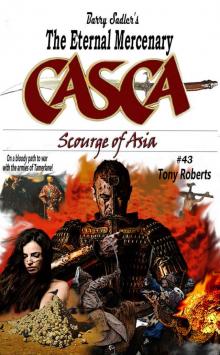 Casca 43: Scourge of Asia
Casca 43: Scourge of Asia The Lombard
The Lombard Casca 49: The Lombard
Casca 49: The Lombard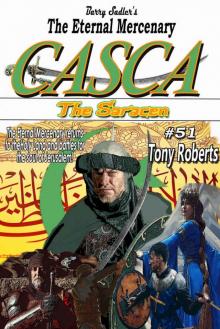 The Saracen
The Saracen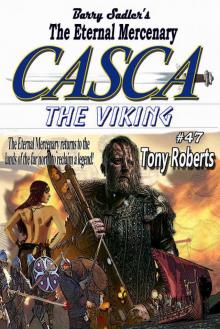 Casca 47: The Viking
Casca 47: The Viking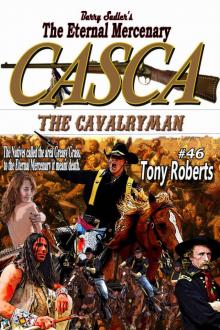 Casca 46: The Cavalryman
Casca 46: The Cavalryman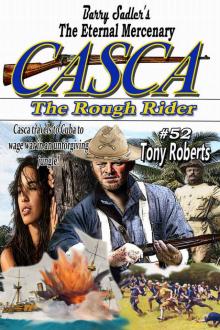 Casca 52- the Rough Rider
Casca 52- the Rough Rider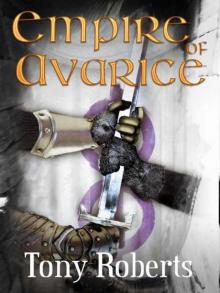 Empire of Avarice
Empire of Avarice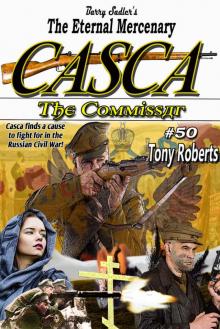 The Commissar
The Commissar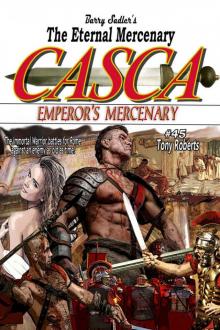 Casca 45: Emperor's Mercenary
Casca 45: Emperor's Mercenary Dark Blade
Dark Blade The Heir of Gorradan (Chronicles of Faerowyn Book 2)
The Heir of Gorradan (Chronicles of Faerowyn Book 2)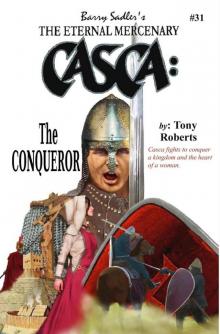 Casca 31: The Conqueror
Casca 31: The Conqueror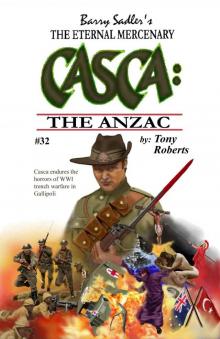 Casca 32: The Anzac
Casca 32: The Anzac The Anzac
The Anzac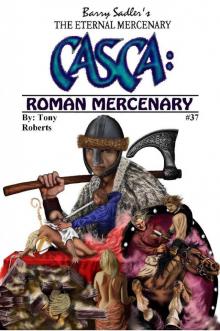 Casca 37: Roman Mercenary
Casca 37: Roman Mercenary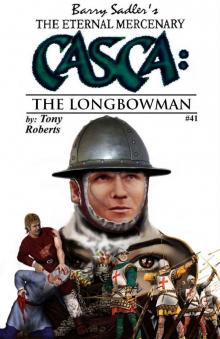 Casca 41: The Longbowman
Casca 41: The Longbowman The Longbowman
The Longbowman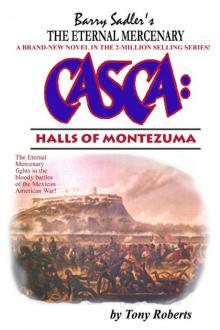 Casca 25: Halls of Montezuma
Casca 25: Halls of Montezuma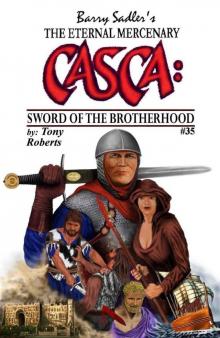 Sword of the Brotherhood
Sword of the Brotherhood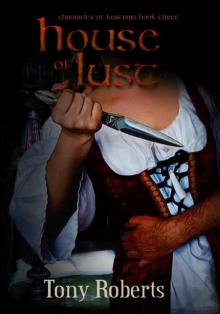 House of Lust
House of Lust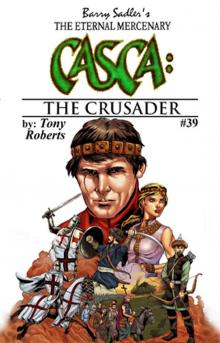 Casca 39 The Crusader
Casca 39 The Crusader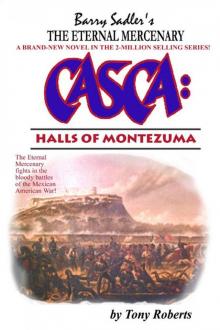 Halls of Montezuma
Halls of Montezuma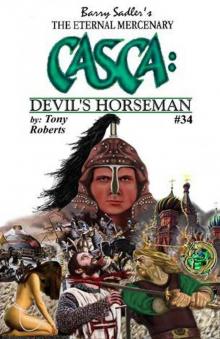 Devil's Horseman
Devil's Horseman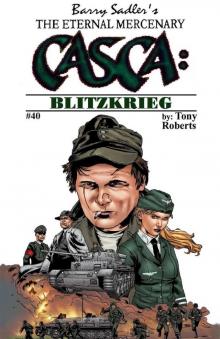 Casca 40: Blitzkrieg
Casca 40: Blitzkrieg Casca 38: The Continental
Casca 38: The Continental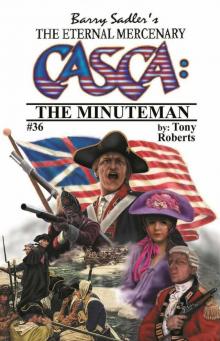 The Minuteman
The Minuteman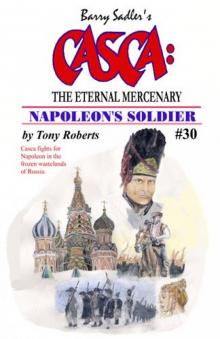 Napoleon's Soldier
Napoleon's Soldier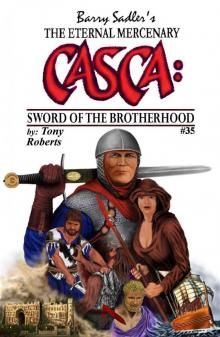 Casca 35: Sword of the Brotherhood
Casca 35: Sword of the Brotherhood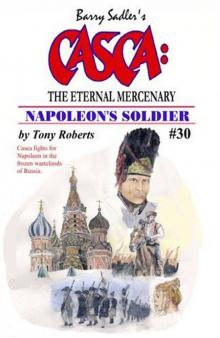 Casca 30: Napoleon's Soldier
Casca 30: Napoleon's Soldier The Continental
The Continental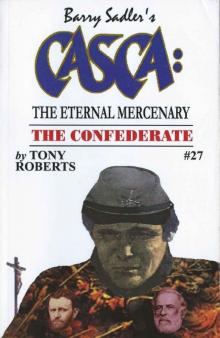 The Confederate
The Confederate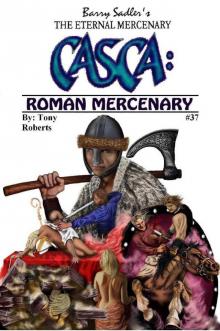 Roman Mercenary
Roman Mercenary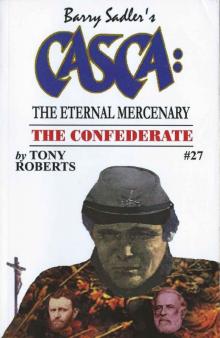 Casca 27: The Confederate
Casca 27: The Confederate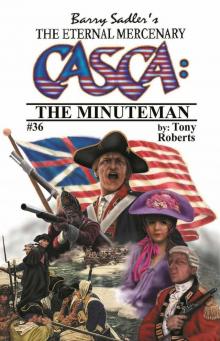 Casca 36: The Minuteman
Casca 36: The Minuteman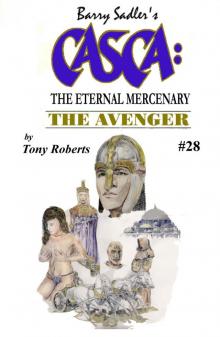 Casca 28: The Avenger
Casca 28: The Avenger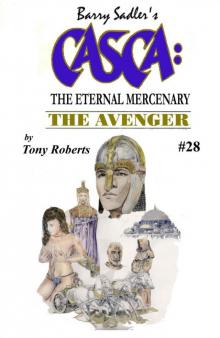 The Avenger
The Avenger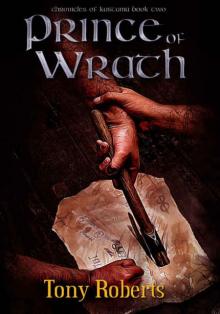 Prince of Wrath
Prince of Wrath